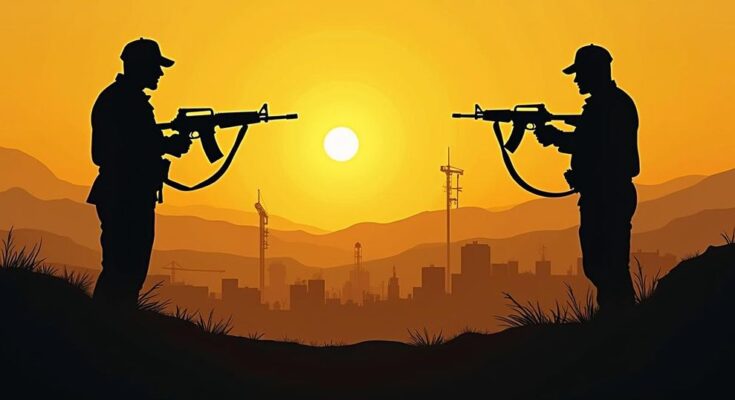In a discussion surrounding the escalating violence between Israel and Hezbollah, experts Aaron David Miller and Hussein Ibish provided insights into Israel’s military strategy and the implications of its operations. They discussed the potential for broader conflict involving Iran, the role of U.S. intervention, and the complex political landscape influencing the actions of both Hezbollah and Israel. The conversation emphasized the urgent need for diplomatic measures to prevent further escalation and protect civilian lives.
In a recent discussion moderated by Geoff Bennett on the ongoing hostilities between Israel and Hezbollah, experts Aaron David Miller and Hussein Ibish provided valuable insights regarding the evolving conflict. Both scholars highlighted the complexities and implications of the military operations being conducted by Israel. Hussein Ibish, a senior resident scholar at the Arab Gulf States Institute, mentioned that the Israeli strikes aim at degrading Hezbollah’s capabilities, akin to their military strategies in Gaza where military assets are targeted irrespective of their direct involvement. He articulated that the Israeli military actions reflect a psychological aspect, intended to serve as a form of psychological warfare and vengeance against a perceived enemy. Conversely, Aaron David Miller from the Carnegie Endowment for International Peace expressed apprehension regarding the potential consequences of Israel’s actions, especially following Hezbollah’s alignment with the so-called Axis of Resistance. He pointed out that this alignment places all of Lebanon at risk, and he raised concerns that relentless military pressure may not yield the desired outcomes for Israel. Both analysts deliberated the likelihood of a ground invasion into Southern Lebanon, with Ibish suggesting that, while Hezbollah’s provocations have escalated tensions, an immediate land invasion is unlikely. However, he posited that Israel might resort to prolonged military operations as a means to create an illusion of security. Miller elaborated on Iran’s position in this conflict, cautioning that a significant escalation involving Israel and Hezbollah could provoke Iran to escalate its involvement. He underscored that neither Iran nor Israel desires a direct large-scale confrontation but noted that the situation remains volatile and capable of spiraling into a broader multilateral conflict. In discussing potential avenues for conflict de-escalation, Ibish suggested that the United States could play a constructive role in restraining Israel’s military actions and promoting dialogue. He highlighted the importance of redefining Hezbollah’s stance on the Gaza conflict to facilitate a more stable regional environment, apprehending that the current dynamics could lead to unforeseen ramifications if not addressed decisively. Finally, as the discussion neared its conclusion, Miller asserted that the U.S. government has yet to impose any substantial consequences on Israeli actions, especially as the region navigates a complex political landscape ahead of significant elections. The discourse illuminated the intricate web of geopolitical relations at play in the Israel-Hezbollah conflict, underscoring the urgent need for diplomatic engagement to mitigate hostilities and prevent the escalation of violence that could engulf the broader region.
The ongoing Israel-Hezbollah conflict represents a culmination of historical tensions and political dynamics within the Middle East. The recent escalation in violence has roots in longstanding territorial disputes, the role of armed non-state actors like Hezbollah, and the influence of external powers such as Iran. The violence has led to substantial civilian casualties and a deteriorating humanitarian situation in Lebanon. As both Israel and Hezbollah engage in military maneuvers with potential ramifications across the region, understanding the motivations and strategies of the involved parties becomes critical in analyzing the broader implications for peace and stability.
In conclusion, the dialogue between Miller and Ibish underscores the complexities of the Israel-Hezbollah conflict, where military strategies, external influences, and humanitarian concerns intersect. The experts convey that while military actions are ongoing, true security and stability will necessitate diplomatic efforts and reconsideration of current strategies by both regional and international powers. The need for a concerted effort towards de-escalation is paramount to avert a larger regional conflict.
Original Source: www.pbs.org




